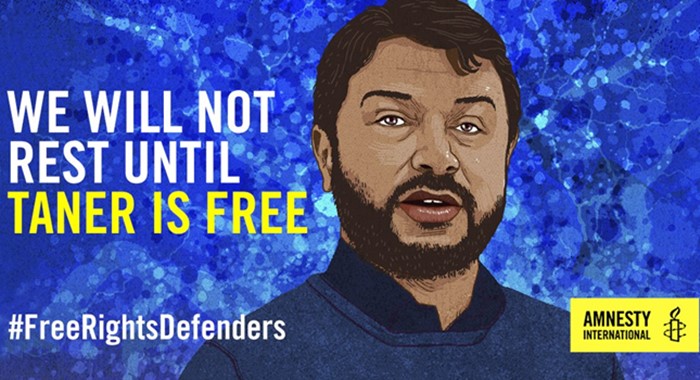The İstanbul 35th High Criminal Court on Thursday ruled to continue the pretrial detention of Amnesty International’s honorary Turkey chair, Taner Kılıç, at the fourth hearing of the trial of 11 human rights activists.
Some of the activists, who were taken into police custody on July 5, 2017 during a meeting on Büyükada, one of İstanbul’s Princes’ Islands, have been accused of membership in a terrorist organization, while others are charged with aiding a terrorist organization without membership in it.
The pro-government media depicted the Büyükada meeting as a follow-up to a failed coup on July 15, 2016. President Recep Tayyip Erdoğan reiterated these claims a few days after the detention of the activists.
The 11 activists were released by the İstanbul 35th High Criminal Court in Oct. 2017 and Kılıç was released in late January; however, upon an objection by the prosecutor, the İstanbul 36th High Criminal Court ordered the arrest of Kılıç due to his alleged links to the Gülen movement.
Kılıç attended the fourth hearing by videoconference from İzmir’s Şakran Prison, where he is being held.
The session started with the testimony of a witness who had provided simultaneous interpretation during the Büyükada meeting, an Amnesty International gathering to discuss the situation of human right activists in risky areas.
“I didn’t have the impression that the meeting was held for a secret objective. Before and after the sessions, they locked the doors of the hall,” the witness said.
A secret witness also testified during the hearing, refusing to answer most of the questions from the defense lawyers to protect their identity.
“After I heard what they said in the meeting, I decided to inform the police since I think if somebody has a problem with the police, that person can’t be a decent person,” the secret witness said.
Kılıç said although the court decision to arrest him was based on alleged use of the ByLock smart phone application, since the last hearing he again has been accused of being an organizer of the Büyükada meeting, which he says he had nothing to do with.
Turkish prosecutors believe Gülen movement followers used ByLock to secretly communicate with each other.
Kılıç also referred to a police report revealing that forensic examinations were carried out on his laptop, mobile phone, three USB drives, a SIM card and a memory card. ByLock does not appear on the list of items found on the phone, including deleted applications.
“[In the police report] they even checked my 15 to 20-year-old e-mails. No one else would have undertaken such an investigation,” Kılıç said, adding that he expected to be released.
The next hearing in the trial is set for Nov. 7.
Amnesty International’s Turkey director of strategy and research, Andrew Gardner also had been in the court, evaluating the decision as “disgraceful.”


